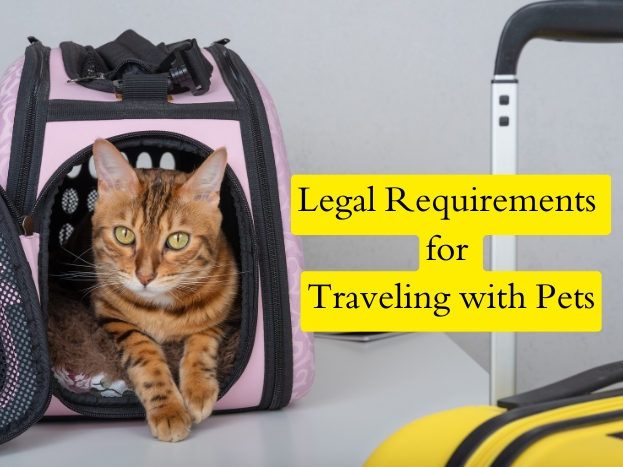Traveling with pets can be a rewarding experience, but it also involves adhering to various legal requirements to ensure the safety and well-being of your pet, as well as compliance with the laws of your destination. From documentation to vaccinations, understanding these requirements is essential for a smooth journey. This guide provides an overview of the key legal considerations for traveling with pets. Learning more with visa.javanet247
1. Essential Documentation for Pet Travel
When traveling with a pet, certain documents are typically required to ensure compliance with international and domestic laws:
- Pet Passport: Many countries issue a pet passport that contains essential information about your pet’s identity, vaccinations, and health status. This document is often required for international travel.
- Health Certificate: A veterinary health certificate, usually issued within 10 days of travel, confirms that your pet is healthy and fit to travel. This certificate is often mandatory for entry into foreign countries.
- Vaccination Records: Proof of up-to-date vaccinations, especially for rabies, is a common requirement for pet travel. Some countries may also require additional vaccinations or treatments, such as tapeworm treatment for dogs.
2. Vaccination and Quarantine Requirements
Different countries have varying vaccination and quarantine regulations:
- Rabies Vaccination: Most countries require proof of rabies vaccination, administered within a specific time frame before travel. Some countries may require a rabies titer test to confirm immunity.
- Quarantine: Certain countries, particularly rabies-free nations like Australia and New Zealand, may require pets to undergo quarantine upon arrival. The length of quarantine can vary based on the country of origin and the pet’s vaccination status.
- Other Vaccinations: Depending on the destination, additional vaccinations for diseases like distemper, parvovirus, or leptospirosis may be required.
3. Airline and Travel Regulations for Pets
Airlines have specific regulations regarding pet travel, which vary by carrier and destination:
- Pet Carriers: Pets traveling by air must be transported in an airline-approved carrier that meets size and ventilation requirements. The carrier must be labeled with your contact information and “Live Animal” markings.
- In-Cabin vs. Cargo: Depending on the size and breed of your pet, they may be allowed to travel in the cabin or be required to travel in the cargo hold. Some airlines have restrictions on certain breeds, especially brachycephalic (short-nosed) breeds, due to their susceptibility to breathing difficulties.
- Pet Travel Fees: Airlines typically charge a fee for transporting pets, which can vary based on the pet’s size, the destination, and whether they travel in the cabin or cargo.
4. Legal Considerations for Traveling with Pets to Specific Countries
Each country has its own set of legal requirements for pet entry:
- European Union: Pets entering EU countries must have a microchip, a valid rabies vaccination, and a pet passport or veterinary certificate. Dogs may also need tapeworm treatment before entering certain countries like the UK and Ireland.
- United States: Pets entering the U.S. must have proof of rabies vaccination and may be subject to additional state-specific requirements. Some states require a health certificate, especially if traveling by air.
- Australia: Australia has strict biosecurity laws, requiring pets to undergo blood tests, vaccinations, and quarantine. The import process is highly regulated and must be planned well in advance.
5. Legal Implications of Non-Compliance
Failing to comply with the legal requirements for pet travel can lead to serious consequences, including:
- Entry Denial: Your pet may be denied entry into the destination country and sent back to the country of origin at your expense.
- Quarantine Extension: Non-compliance with vaccination or documentation requirements may result in extended quarantine periods.
- Fines and Penalties: Some countries impose fines or legal penalties for failing to adhere to their pet import regulations.
6. Tips for Ensuring a Smooth Travel Experience with Pets
- Research Requirements Early: Start researching the legal requirements for your destination as early as possible, as some preparations, like vaccinations or blood tests, may need to be done months in advance.
- Consult Your Veterinarian: Your veterinarian can provide valuable advice on preparing your pet for travel, including administering necessary vaccinations and issuing health certificates.
- Check Airline Policies: Review your airline’s pet travel policies carefully and ensure you meet all requirements for pet carriers, documentation, and fees.
- Prepare for Emergencies: Carry a pet first-aid kit and have contact information for veterinary services at your destination.
Conclusion
Traveling with your pet can be a joyful experience, but it requires careful planning and compliance with legal requirements. By understanding the necessary documentation, vaccinations, and regulations, you can ensure a smooth and safe journey for both you and your pet. Always check the latest requirements for your destination and consult with your veterinarian to be fully prepared.

